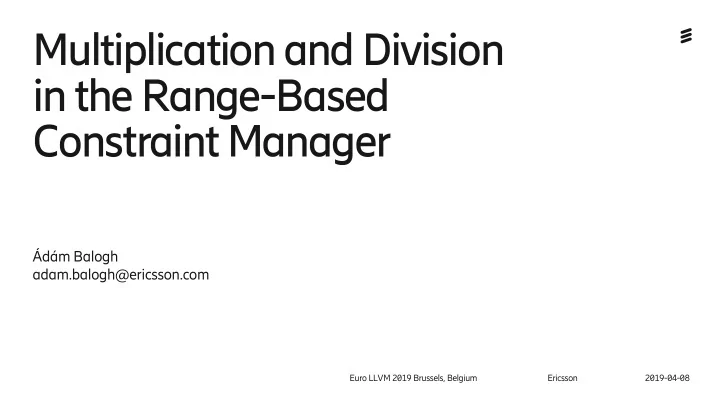

Multiplication and Division in the Range-Based Constraint Manager Ádám Balogh adam.balogh@ericsson.com Euro LLVM 2019 Brussels, Belgium Ericsson 2019-04-08 Ericsson Internal | 2018-02-21
Range-Based Constraint Manager — Default in Clang Static Analyzer Ericsson Internal | 2018-02-21
Range-Based Constraint Manager — Default in Clang Static Analyzer — Good performance: more than 20 times faster than MS Z3 (our measurement) Ericsson Internal | 2018-02-21
Range-Based Constraint Manager — Default in Clang Static Analyzer — Good performance: more than 20 times faster than MS Z3 (our measurement) — Limited deduction capabilities: only symbol plus/minus concrete integer compared to another integer Ericsson Internal | 2018-02-21
Range-Based Constraint Manager — Default in Clang Static Analyzer — Good performance: more than 20 times faster than MS Z3 (our measurement) — Limited deduction capabilities: only symbol plus/minus concrete integer compared to another integer Code Ranges signed char n = get_number(); n: [-128..127] assert(i >= 100); n: [100..127] == [-128..127]&[100..127] assert(i + 20 <= -120); n: [108..116] == [100..127]&([-128..-120]-20) Ericsson Internal | 2018-02-21
The Problem: False Positive — The result of multiplicative operations is unknown: true_negative.c false_positive.c int size = 4, n, i; int size = 4, n, i; for (i = 0; i < size - 2; ++i) for (i = 0; i < size / 2; ++i) init(&n); init(&n); use(n); // no warning use(n); // warning: n unitialized Ericsson Internal | 2018-02-21
The Problem: False Positive — The result of multiplicative operations is unknown: true_negative.c false_positive.c int size = 4, n, i; int size = 4, n, i; int size = 4, n, i; int size = 4, n, i; for (i = 0; i < size - 2; ++i) for (i = 0; i < size - 2; ++i) for (i = 0; i < size / 2; ++i) for (i = 0; i < size / 2; ++i) init(&n); init(&n); init(&n); init(&n); use(n); // no warning use(n); // no warning use(n); // warning: n unitialized use(n); // warning: n unitialized Ericsson Internal | 2018-02-21
The Problem: False Positive — The result of multiplicative operations is unknown: true_negative.c false_positive.c int size = 4, n, i; int size = 4, n, i; int size = 4, n, i; int size = 4, n, i; for (i = 0; i < size - 2; ++i) for (i = 0; i < size - 2; ++i) for (i = 0; i < size / 2; ++i) for (i = 0; i < size / 2; ++i) init(&n); init(&n); init(&n); init(&n); use(n); // no warning use(n); // no warning use(n); // warning: n unitialized use(n); // warning: n unitialized — Z3 refutation may help to get rid of these false positives Ericsson Internal | 2018-02-21
The Problem: False Negative — Z3 refutation, does not help to get rid of false negatives true_positive.c false_negative.c int n = get_number(); int n = get_number(); assert (n <= 2); assert (n <= 2); assert (n + 2 >= 4); assert (n * 2 >= 4); 1 / (n - 2); // div. by zero 1 / (n - 2); // no warning Ericsson Internal | 2018-02-21
The Problem: False Negative — Z3 refutation, does not help to get rid of false negatives true_positive.c false_negative.c int n = get_number(); int n = get_number(); int n = get_number(); int n = get_number(); assert (n <= 2); assert (n <= 2); assert (n <= 2); assert (n <= 2); assert (n + 2 >= 4); assert (n + 2 >= 4); assert (n * 2 >= 4); assert (n * 2 >= 4); 1 / (n - 2); // div. by zero 1 / (n - 2); // div. by zero 1 / (n - 2); // no warning 1 / (n - 2); // no warning Ericsson Internal | 2018-02-21
Patches Implementing Multiplicative Arithmetic — Much more complex than addition and subtraction (== shifting ranges circularly) Ericsson Internal | 2018-02-21
Patches Implementing Multiplicative Arithmetic — Much more complex than addition and subtraction (== shifting ranges circularly) n / 20 == 5 100 119 Ericsson Internal | 2018-02-21
Patches Implementing Multiplicative Arithmetic — Much more complex than addition and subtraction (== shifting ranges circularly) n / 20 == 5 100 119 n * 6 == 8 44 -84 Ericsson Internal | 2018-02-21
Patches Implementing Multiplicative Arithmetic — Much more complex than addition and subtraction (== shifting ranges circularly) n / 20 == 5 100 119 n * 6 == 8 44 -84 n * 3 < 7 -84 -42 2 43 87 Ericsson Internal | 2018-02-21
Patches Implementing Multiplicative Arithmetic — Much more complex than addition and subtraction (== shifting ranges circularly) n / 20 == 5 100 119 n * 6 == 8 44 -84 n * 3 < 7 -84 -42 2 43 87 — May result in huge number of ranges if multiplier is a large number (performance impact) Ericsson Internal | 2018-02-21
Patches Implementing Multiplicative Arithmetic — Much more complex than addition and subtraction (== shifting ranges circularly) n / 20 == 5 100 119 n * 6 == 8 44 -84 n * 3 < 7 -84 -42 2 43 87 — May result in huge number of ranges if multiplier is a large number (performance impact) — Negative multipliers and divisors reverse the inequality operator Ericsson Internal | 2018-02-21
Patches Implementing Multiplicative Arithmetic — Much more complex than addition and subtraction (== shifting ranges circularly) n / 20 == 5 100 119 n * 6 == 8 44 -84 n * 3 < 7 -84 -42 2 43 87 — May result in huge number of ranges if multiplier is a large number (performance impact) — Negative multipliers and divisors reverse the inequality operator — Patches under review: https://reviews.llvm.org/D50256 & https://reviews.llvm.org/D49074 Ericsson Internal | 2018-02-21
Thank You! adam.balogh@ericsson.com
Recommend
More recommend